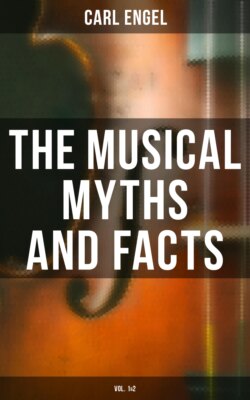Читать книгу The Musical Myths and Facts (Vol. 1&2) - Engel Carl - Страница 13
На сайте Литреса книга снята с продажи.
CELESTIAL QUARRELS.
ОглавлениеTable of Contents
There appears to be a notion universally prevailing among uncivilised people that, during an eclipse of the sun or moon, the two luminaries are quarrelling with each other, or that their conjugal happiness is being disturbed by some intruding monster.
The natives of the Polynesian Islands have an old tradition, according to which the moon (called marama) is the wife of the sun (called ra), and, during an eclipse, the moon is supposed to be bitten or pinched by some angry spirit.[12]
The Javanese, and the natives of the Indian Archipelago in general, when an eclipse takes place, shout and beat gongs to prevent the sun or moon from being devoured by the great dragon (called nága), which they suppose to be attacking the luminary.[13] This notion appears to have been adopted by the Malays from the Hindus, in whose mythology a god called Rahu—who is recorded to have been originally a giant, and who is painted black—at the time of an eclipse swallows up the sun and moon, and vomits them up again.
Of the Chinese we are told: "As soon as they perceive that the sun or moon begins to be darkened, they throw themselves on their knees and knock their foreheads against the earth. A noise of drums and cymbals is immediately heard throughout the whole city. This is the remains of an ancient opinion entertained in China, that by such a horrid din they assist the suffering luminary, and prevent it from being devoured by the celestial dragon."[14]
The Greenlanders have, according to Crantz, a somewhat similar tradition; but, instead of musical instruments, the men carry kettles and boxes to the top of the house, and rattle and beat them, and the women pinch the dogs by the ears, to frighten away the moon, who, they suppose, is insulting his wife, the sun.[15] In Greenland, the moon is the man, and the sun is the wife, as in Germany.
Again, the Negroes in Western Africa appear to have much the same notion. The traveller Lander, during his stay at Boussa in Soudan, witnessed the wild behaviour of the Negroes at the occurrence of an eclipse of the moon. Their principal exertions to avert the supposed impending calamity consisted in blowing trumpets, beating drums, singing and shouting.[16]
The Japanese legend of the sun-goddess, who, after having hidden herself in a cavern, is enticed from her dark abode by the power of music, is apparently likewise a poetical conception of an eclipse. Titsingh, in reciting the same tradition, says that Fensio-Daysin, the sun-goddess, fled to the cavern in consequence of a dispute she had with her brother, Sasanno-Ono-Mikotto, the god of the moon.[17]
From these examples it seems that musical performances, or, at least, the sounds of loud instruments, are considered the most effective agent for appeasing the anger of the quarrelling celestial bodies. But there is no reason to assume that this peculiar notion originally emanated from one people. Like several other popular traditions, it most likely owes its origin to impressions produced on the mind by a certain natural phenomenon; and it may, therefore, have suggested itself to different nations quite independently, instead of having been transmitted from one nation to another.
